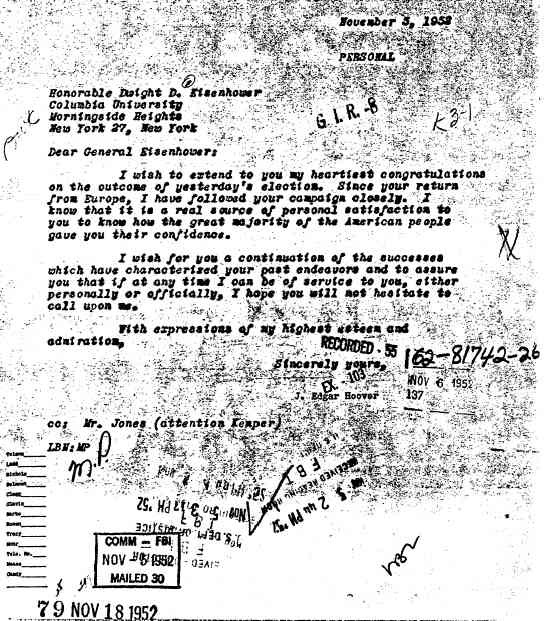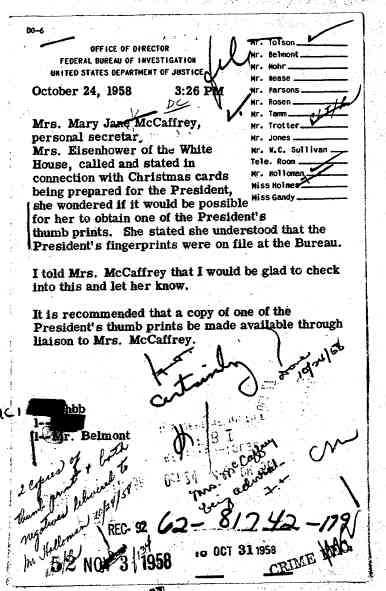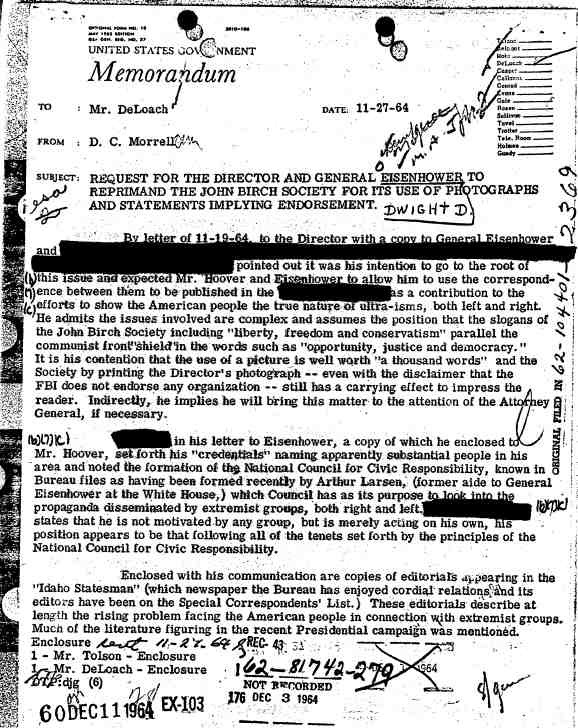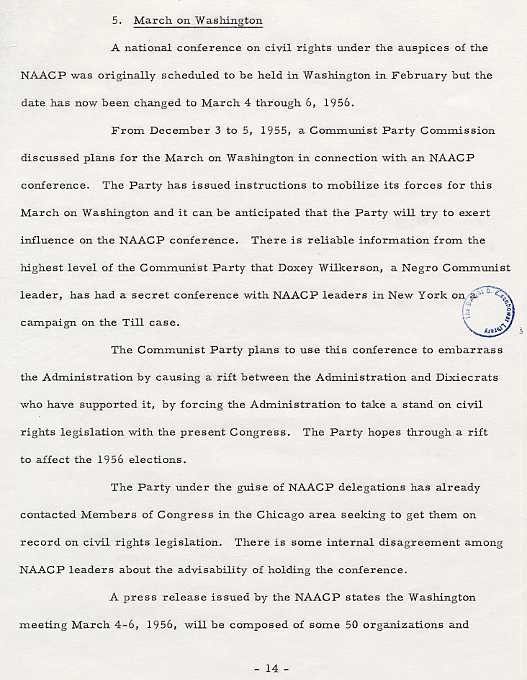Starting from:
$12.95
President Dwight D. Eisenhower FBI - CIA Files
President Dwight D. Eisenhower FBI - CIA Files
1128 pages of Dwight D. Eisenhower FBI Files and CIA Files
FBI FILES
940 pages of FBI files dating from1947 to 1981, connected with Dwight D. Eisenhower. Files contain approximately 620 pages of discernable memos.
Topics covered include Eisenhower's disposition in the military. His political future. Letters from the general public on a wide range of concerns about Eisenhower. Correspondences between FBI director J. Edgar Hoover and Dwight Eisenhower. Threats made against the life of Eisenhower. Security concerns about presidential travel. The search for the whereabouts of, and background information on Kay Summersby. When he was Supreme Commander of Allied Forces during World War II, Kay Summersby was assigned to drive General Eisenhower during a visit to London. She later became Eisenhower's personal secretary and military aide. The nature of their relationship is still up for argument. Files show Eisenhower's relationship with the FBI. Hoover's presentation to the White House concerning racial tensions and civil rights. Hoover's monograph, "The Communist Party and the Negro." Correspondences from Hoover to the White House about the murder of Emmett Till. A threaten lawsuit against Eisenhower over a minor traffic accident his chauffeur had while driving Eisenhower's station wagon. Memos giving a wide range of background information on the city of Denver, Colorado. Since Eisenhower was spending much time in Denver, the FBI set about summerizing details about the city, such as crime trends, FBI activity, Communist Party activity, organized crime, and the Denver press. Eisenhower's travel after leaving the White House. A memo showing that in 1967, after seeing a performance by "Up With People", Eisenhower became concerned about their sponsor organization Moral Rearmament.
CIA FILES
188 pages of CIA files dating from 1952 to1962, connected with Dwight D. Eisenhower.
Files include: CIA staff accounts of briefings of Eisenhower. Memorandums concerning Eisenhower's guidelines for the use of nuclear weapons. Missile warning systems. A report ordered by President Eisenhower of CIA covert activities, which outlines the agency's theories and policies concerning covert activities.
Dwight D. Eisenhower was born in Denison, Texas in 1890, and was brought up in Abilene, Kansas. In his early Army career, after graduating from West Point, he excelled in staff assignments, serving under Generals John J. Pershing, Douglas MacArthur, and Walter Krueger. After Pearl Harbor, General George C. Marshall called him to Washington for a war plans assignment. He commanded the Allied Forces landing in North Africa in November 1942; on D-Day, 1944, he was the Supreme Commander of the troops invading France. Believing that military professionals should not be involved in politics, Eisenhower resisted overtures from both Republicans and Democrats, that he run for president in 1948. After the war, he became President of Columbia University. He later was given supreme command over the new NATO forces being assembled in 1951. Republican emissaries to his headquarters near Paris persuaded him to run for President in 1952. He won handily in that election and in 1956, each time defeating Democratic candidate Adlai Stevenson by a substantial margin. After serving two terms as president, Eisenhower retired to his farm in Gettysburg, Pennsylvania, where he wrote his memoirs, played golf and painted. He lived to see Richard Nixon elected president in 1968 and his grandson, David, marry Nixon's younger daughter, Julie. Dwight Eisenhower died in 1969.





1128 pages of Dwight D. Eisenhower FBI Files and CIA Files
FBI FILES
940 pages of FBI files dating from1947 to 1981, connected with Dwight D. Eisenhower. Files contain approximately 620 pages of discernable memos.
Topics covered include Eisenhower's disposition in the military. His political future. Letters from the general public on a wide range of concerns about Eisenhower. Correspondences between FBI director J. Edgar Hoover and Dwight Eisenhower. Threats made against the life of Eisenhower. Security concerns about presidential travel. The search for the whereabouts of, and background information on Kay Summersby. When he was Supreme Commander of Allied Forces during World War II, Kay Summersby was assigned to drive General Eisenhower during a visit to London. She later became Eisenhower's personal secretary and military aide. The nature of their relationship is still up for argument. Files show Eisenhower's relationship with the FBI. Hoover's presentation to the White House concerning racial tensions and civil rights. Hoover's monograph, "The Communist Party and the Negro." Correspondences from Hoover to the White House about the murder of Emmett Till. A threaten lawsuit against Eisenhower over a minor traffic accident his chauffeur had while driving Eisenhower's station wagon. Memos giving a wide range of background information on the city of Denver, Colorado. Since Eisenhower was spending much time in Denver, the FBI set about summerizing details about the city, such as crime trends, FBI activity, Communist Party activity, organized crime, and the Denver press. Eisenhower's travel after leaving the White House. A memo showing that in 1967, after seeing a performance by "Up With People", Eisenhower became concerned about their sponsor organization Moral Rearmament.
CIA FILES
188 pages of CIA files dating from 1952 to1962, connected with Dwight D. Eisenhower.
Files include: CIA staff accounts of briefings of Eisenhower. Memorandums concerning Eisenhower's guidelines for the use of nuclear weapons. Missile warning systems. A report ordered by President Eisenhower of CIA covert activities, which outlines the agency's theories and policies concerning covert activities.
Dwight D. Eisenhower was born in Denison, Texas in 1890, and was brought up in Abilene, Kansas. In his early Army career, after graduating from West Point, he excelled in staff assignments, serving under Generals John J. Pershing, Douglas MacArthur, and Walter Krueger. After Pearl Harbor, General George C. Marshall called him to Washington for a war plans assignment. He commanded the Allied Forces landing in North Africa in November 1942; on D-Day, 1944, he was the Supreme Commander of the troops invading France. Believing that military professionals should not be involved in politics, Eisenhower resisted overtures from both Republicans and Democrats, that he run for president in 1948. After the war, he became President of Columbia University. He later was given supreme command over the new NATO forces being assembled in 1951. Republican emissaries to his headquarters near Paris persuaded him to run for President in 1952. He won handily in that election and in 1956, each time defeating Democratic candidate Adlai Stevenson by a substantial margin. After serving two terms as president, Eisenhower retired to his farm in Gettysburg, Pennsylvania, where he wrote his memoirs, played golf and painted. He lived to see Richard Nixon elected president in 1968 and his grandson, David, marry Nixon's younger daughter, Julie. Dwight Eisenhower died in 1969.





1 file (286.5MB)



